Analyzing Impact: Healthcare Initiative & Veteran Mental Health
VerifiedAdded on 2023/03/31
|12
|2780
|355
Essay
AI Summary
This essay assesses the impact of the Five-Year Forward View for Mental Health, with specific reference to the Defense People Mental Health and Wellbeing Strategy 2017-2022, on the wellbeing of veterans in the United Kingdom. It provides a historical context of mental healthcare development in the UK, highlighting the shift from institutionalized care to community-based approaches. The essay acknowledges the challenges faced by veterans, including reluctance to seek help due to stigma, and discusses how the initiative aims to integrate care, address physical, social, and mental needs, and deliver personalized and effective services. It also emphasizes the importance of collaboration among organizations and the potential for mental health nurses to play a crucial role in providing support and care to veterans. The essay concludes by highlighting the need for continued efforts to improve healthcare utilization among veterans and address disparities in access to mental healthcare services.
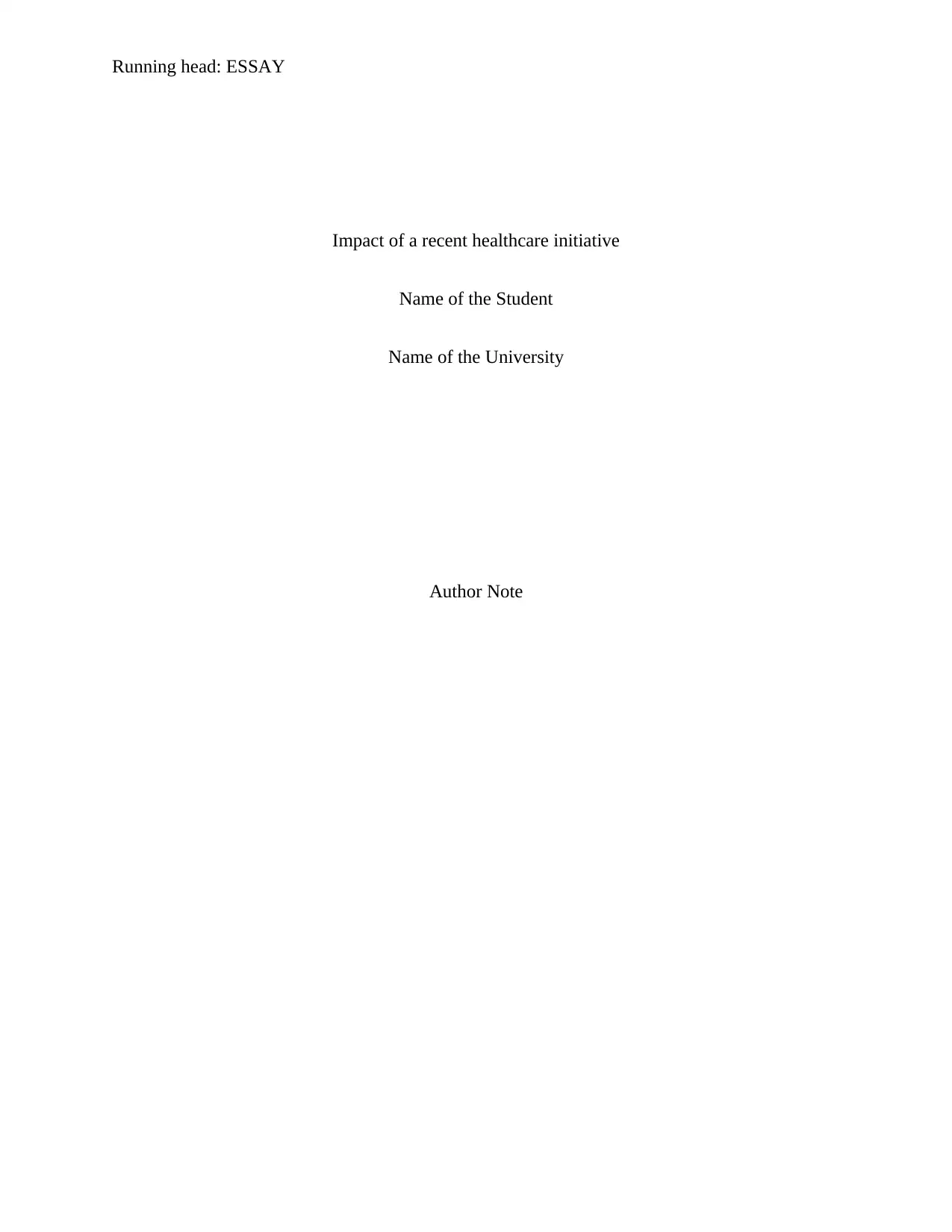
Running head: ESSAY
Impact of a recent healthcare initiative
Name of the Student
Name of the University
Author Note
Impact of a recent healthcare initiative
Name of the Student
Name of the University
Author Note
Paraphrase This Document
Need a fresh take? Get an instant paraphrase of this document with our AI Paraphraser

1ESSAY
Introduction- Mental health is an umbrella term that commonly refers to presence of
psychological wellbeing and absence of any mental disorders in an individual (Becker et al.
2015). The World Health Organisation defines mental health as a state of perceive self-efficacy,
subjective wellbeing, competence, intergenerational dependence, autonomy, and self-
actualization of the emotional and intellectual potential of a person among other individuals
(WHO 2014). The term veteran commonly refers to a person who had a long experience or
service in a particular occupation (Herman and Yarwood 2015). Nursing practitioners are present
on the front line for providing care services to veterans. They are armed with full practice
authorities and have the necessary expertise of addressing unique health concerns that are faced
by the veterans, ranging from mental issues to disease exposure, and amputation. This essay will
evaluate the impact of a contemporary healthcare initiative named the Five-Year Forward View
for Mental Help on the wellbeing of veterans; with special reference to Defense People Mental
Health and
Wellbeing Strategy 2017-2022
Historical and current developments in healthcare- According to Österle (2017) Care in
the community refers to a British policy based on deinstitutionalization that focused on caring
and treating mentally and physically disabled individuals in their home premises, in place of
healthcare institution. The history of mental healthcare development in the UK can be traced
back to the formulation and enforcement of the Madhouses Act in 1774 that has been identified
as the pioneer legislation, based on mental health (Antony 2016).
This was followed by enforcement of the Lunacy Act in 1845 that established Board of
Commissioners who developed lunatic asylum financed by local rates. The Lunacy Act proposed
in 1862 also provided permission for voluntary admission of any person who had been a patient
Introduction- Mental health is an umbrella term that commonly refers to presence of
psychological wellbeing and absence of any mental disorders in an individual (Becker et al.
2015). The World Health Organisation defines mental health as a state of perceive self-efficacy,
subjective wellbeing, competence, intergenerational dependence, autonomy, and self-
actualization of the emotional and intellectual potential of a person among other individuals
(WHO 2014). The term veteran commonly refers to a person who had a long experience or
service in a particular occupation (Herman and Yarwood 2015). Nursing practitioners are present
on the front line for providing care services to veterans. They are armed with full practice
authorities and have the necessary expertise of addressing unique health concerns that are faced
by the veterans, ranging from mental issues to disease exposure, and amputation. This essay will
evaluate the impact of a contemporary healthcare initiative named the Five-Year Forward View
for Mental Help on the wellbeing of veterans; with special reference to Defense People Mental
Health and
Wellbeing Strategy 2017-2022
Historical and current developments in healthcare- According to Österle (2017) Care in
the community refers to a British policy based on deinstitutionalization that focused on caring
and treating mentally and physically disabled individuals in their home premises, in place of
healthcare institution. The history of mental healthcare development in the UK can be traced
back to the formulation and enforcement of the Madhouses Act in 1774 that has been identified
as the pioneer legislation, based on mental health (Antony 2016).
This was followed by enforcement of the Lunacy Act in 1845 that established Board of
Commissioners who developed lunatic asylum financed by local rates. The Lunacy Act proposed
in 1862 also provided permission for voluntary admission of any person who had been a patient

2ESSAY
in a mental hospital in the preceding 5 years (Takabayashi 2017). At the time of establishment of
the NHS, mental care services were not completely integrated with other physical health services
that could also be accredited to shortage of staff, money, and building. Increasing number of
patients, particularly older adults resulted in a shift in the policies from mental health institutions
and recognised the need for community care and day centres.
The current aspect of psychiatric nursing is based on enhanced communication skills. As
pointed out by Gros, Szafranski and Acierno (2016), mental health nursing demands empathy
and sensitive nature. Therapeutic nursing is often characterised by enhanced level of
communication that can work on answering the queries of the individuals suffering from poor
mental health conditions
Veteran in the United Kingdom- As per government reports they are estimated 2.6 million
veterans residing in the UK. Under circumstances when such servicemen or women leave the
military forces, their health care and wellbeing is considered the major responsibility of the NHS,
which is the stakeholder (NHS 2018). The mentioned stakeholders for the stated policy states
that military mental healthcare services have not improved a lot (nhs.uk, 2016). The mentioned
services are seen to provide intensive treatment and care not inclusive of support and is rather
concentrated on providing medications. In similar regards, it can be easily stated that there is a
need to ensure that mental health care plans in the UK embraces a holistic approach. Unlike the
current policy that discusses only about the mental wellbeing of veterans, it is important to have
a word about the currently serving military individuals.
There remains no doubt that the initiative undertaken by the UK government deserves
appreciation. However, veterans choose not to seek the required help. The reluctance to seek
in a mental hospital in the preceding 5 years (Takabayashi 2017). At the time of establishment of
the NHS, mental care services were not completely integrated with other physical health services
that could also be accredited to shortage of staff, money, and building. Increasing number of
patients, particularly older adults resulted in a shift in the policies from mental health institutions
and recognised the need for community care and day centres.
The current aspect of psychiatric nursing is based on enhanced communication skills. As
pointed out by Gros, Szafranski and Acierno (2016), mental health nursing demands empathy
and sensitive nature. Therapeutic nursing is often characterised by enhanced level of
communication that can work on answering the queries of the individuals suffering from poor
mental health conditions
Veteran in the United Kingdom- As per government reports they are estimated 2.6 million
veterans residing in the UK. Under circumstances when such servicemen or women leave the
military forces, their health care and wellbeing is considered the major responsibility of the NHS,
which is the stakeholder (NHS 2018). The mentioned stakeholders for the stated policy states
that military mental healthcare services have not improved a lot (nhs.uk, 2016). The mentioned
services are seen to provide intensive treatment and care not inclusive of support and is rather
concentrated on providing medications. In similar regards, it can be easily stated that there is a
need to ensure that mental health care plans in the UK embraces a holistic approach. Unlike the
current policy that discusses only about the mental wellbeing of veterans, it is important to have
a word about the currently serving military individuals.
There remains no doubt that the initiative undertaken by the UK government deserves
appreciation. However, veterans choose not to seek the required help. The reluctance to seek
⊘ This is a preview!⊘
Do you want full access?
Subscribe today to unlock all pages.

Trusted by 1+ million students worldwide
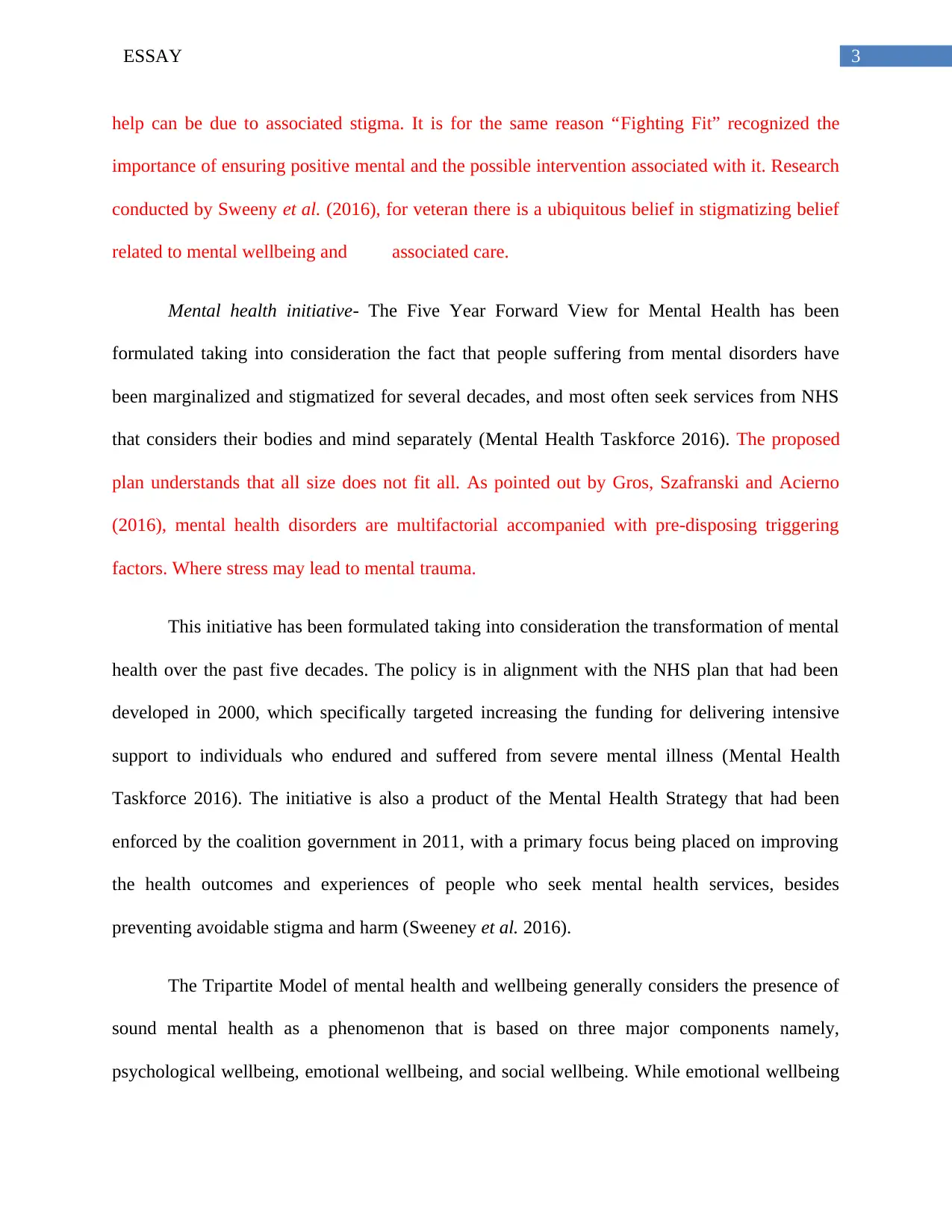
3ESSAY
help can be due to associated stigma. It is for the same reason “Fighting Fit” recognized the
importance of ensuring positive mental and the possible intervention associated with it. Research
conducted by Sweeny et al. (2016), for veteran there is a ubiquitous belief in stigmatizing belief
related to mental wellbeing and associated care.
Mental health initiative- The Five Year Forward View for Mental Health has been
formulated taking into consideration the fact that people suffering from mental disorders have
been marginalized and stigmatized for several decades, and most often seek services from NHS
that considers their bodies and mind separately (Mental Health Taskforce 2016). The proposed
plan understands that all size does not fit all. As pointed out by Gros, Szafranski and Acierno
(2016), mental health disorders are multifactorial accompanied with pre-disposing triggering
factors. Where stress may lead to mental trauma.
This initiative has been formulated taking into consideration the transformation of mental
health over the past five decades. The policy is in alignment with the NHS plan that had been
developed in 2000, which specifically targeted increasing the funding for delivering intensive
support to individuals who endured and suffered from severe mental illness (Mental Health
Taskforce 2016). The initiative is also a product of the Mental Health Strategy that had been
enforced by the coalition government in 2011, with a primary focus being placed on improving
the health outcomes and experiences of people who seek mental health services, besides
preventing avoidable stigma and harm (Sweeney et al. 2016).
The Tripartite Model of mental health and wellbeing generally considers the presence of
sound mental health as a phenomenon that is based on three major components namely,
psychological wellbeing, emotional wellbeing, and social wellbeing. While emotional wellbeing
help can be due to associated stigma. It is for the same reason “Fighting Fit” recognized the
importance of ensuring positive mental and the possible intervention associated with it. Research
conducted by Sweeny et al. (2016), for veteran there is a ubiquitous belief in stigmatizing belief
related to mental wellbeing and associated care.
Mental health initiative- The Five Year Forward View for Mental Health has been
formulated taking into consideration the fact that people suffering from mental disorders have
been marginalized and stigmatized for several decades, and most often seek services from NHS
that considers their bodies and mind separately (Mental Health Taskforce 2016). The proposed
plan understands that all size does not fit all. As pointed out by Gros, Szafranski and Acierno
(2016), mental health disorders are multifactorial accompanied with pre-disposing triggering
factors. Where stress may lead to mental trauma.
This initiative has been formulated taking into consideration the transformation of mental
health over the past five decades. The policy is in alignment with the NHS plan that had been
developed in 2000, which specifically targeted increasing the funding for delivering intensive
support to individuals who endured and suffered from severe mental illness (Mental Health
Taskforce 2016). The initiative is also a product of the Mental Health Strategy that had been
enforced by the coalition government in 2011, with a primary focus being placed on improving
the health outcomes and experiences of people who seek mental health services, besides
preventing avoidable stigma and harm (Sweeney et al. 2016).
The Tripartite Model of mental health and wellbeing generally considers the presence of
sound mental health as a phenomenon that is based on three major components namely,
psychological wellbeing, emotional wellbeing, and social wellbeing. While emotional wellbeing
Paraphrase This Document
Need a fresh take? Get an instant paraphrase of this document with our AI Paraphraser

4ESSAY
is defined as the presence of positive emotions, psychological and social wellbeing are associated
with the presence of social skills, psychological expertise and abilities that directly contribute to
optimal daily life functioning among the patients (Joshanloo, Jose and Kielpikowski 2017).
Hence, it can be suggested that the basic principles, which underpin the initiative such as,
integrating care, addressing the physical, social, and mental needs of the affected people, and
delivering them in a way that is personal, effective, safe, and least restrictive would greatly
enhance the state of mind of veterans. The aforementioned policy will provide mental health
nurses the opportunity to accurately plan and provide medical and nursing support and care to
the veterans who report presence of depression, anxiety, or PTSD.
It has also been found that alcohol consumption and cigarette smoking is highly prevalent
among veterans, when compared to their non-military counterparts (Takabayashi 2017). This is
adequately addressed by the policy that elaborates on the fact that individuals having lived
experiences of mental disorders, health and social care professionals, and carers often consider
prevention of mental illness of utmost importance, and huge what remains to be done for
eliminating the disparities and inequalities in the services that are already existing (Joshanloo,
Jose and Kielpikowski 2017). However, it can be stated that addiction to certain substance can be
termed as disease as the brain hormones that can enhance the dependency over the drugs.
However, based on nursing intervention it is critical to keep track on the possible causes
that leads to stress (Takabayashi, 2017). The initiative also recommends working in partnership
with different organizations, for transforming the health plans, in order to increase their access to
high quality mental health services as and when required (Mental Health Taskforce 2016). Due
focus is placed on sustainability and transformation plans that cover different health aspects in
local geography, based on evidences how the local regions ensure a collaborative approach that
is defined as the presence of positive emotions, psychological and social wellbeing are associated
with the presence of social skills, psychological expertise and abilities that directly contribute to
optimal daily life functioning among the patients (Joshanloo, Jose and Kielpikowski 2017).
Hence, it can be suggested that the basic principles, which underpin the initiative such as,
integrating care, addressing the physical, social, and mental needs of the affected people, and
delivering them in a way that is personal, effective, safe, and least restrictive would greatly
enhance the state of mind of veterans. The aforementioned policy will provide mental health
nurses the opportunity to accurately plan and provide medical and nursing support and care to
the veterans who report presence of depression, anxiety, or PTSD.
It has also been found that alcohol consumption and cigarette smoking is highly prevalent
among veterans, when compared to their non-military counterparts (Takabayashi 2017). This is
adequately addressed by the policy that elaborates on the fact that individuals having lived
experiences of mental disorders, health and social care professionals, and carers often consider
prevention of mental illness of utmost importance, and huge what remains to be done for
eliminating the disparities and inequalities in the services that are already existing (Joshanloo,
Jose and Kielpikowski 2017). However, it can be stated that addiction to certain substance can be
termed as disease as the brain hormones that can enhance the dependency over the drugs.
However, based on nursing intervention it is critical to keep track on the possible causes
that leads to stress (Takabayashi, 2017). The initiative also recommends working in partnership
with different organizations, for transforming the health plans, in order to increase their access to
high quality mental health services as and when required (Mental Health Taskforce 2016). Due
focus is placed on sustainability and transformation plans that cover different health aspects in
local geography, based on evidences how the local regions ensure a collaborative approach that
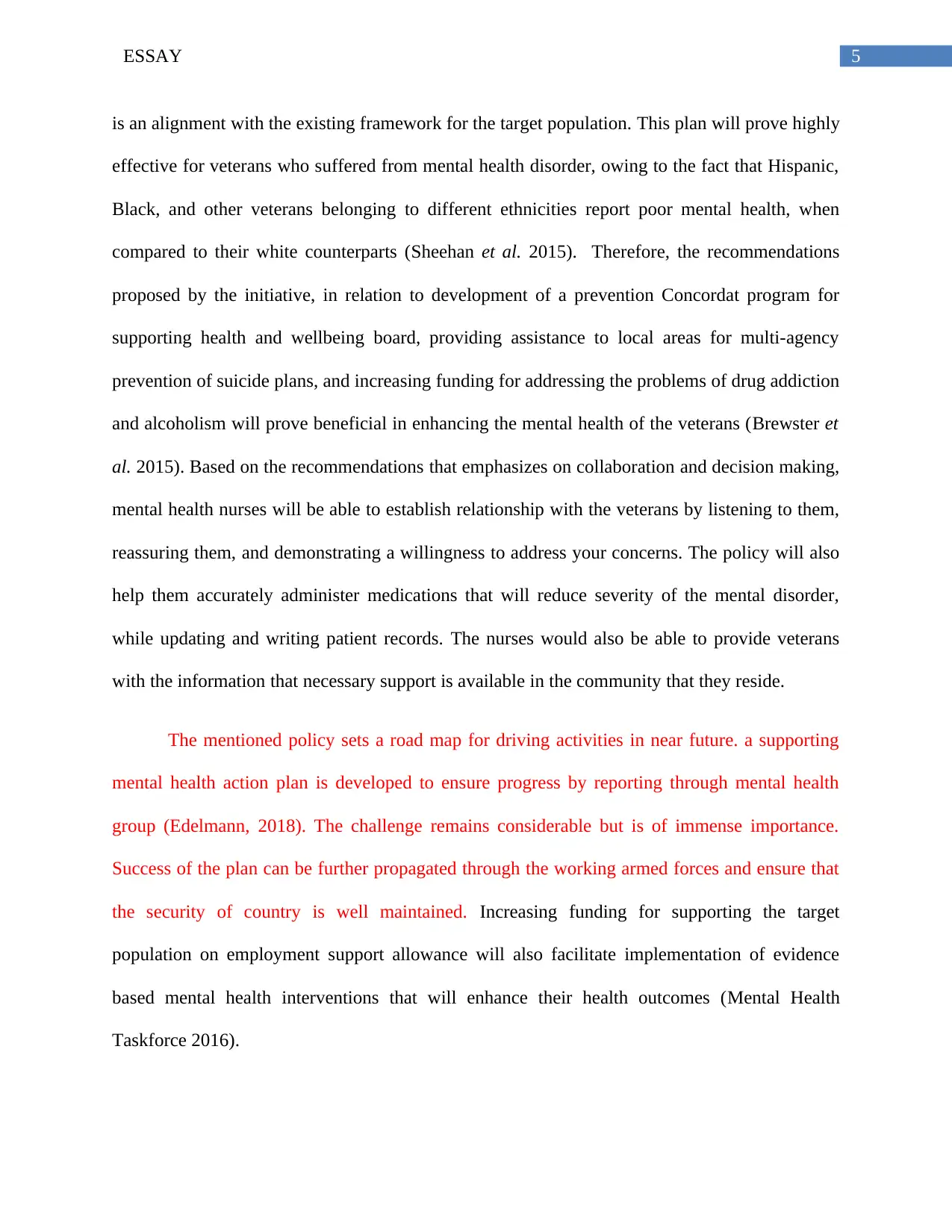
5ESSAY
is an alignment with the existing framework for the target population. This plan will prove highly
effective for veterans who suffered from mental health disorder, owing to the fact that Hispanic,
Black, and other veterans belonging to different ethnicities report poor mental health, when
compared to their white counterparts (Sheehan et al. 2015). Therefore, the recommendations
proposed by the initiative, in relation to development of a prevention Concordat program for
supporting health and wellbeing board, providing assistance to local areas for multi-agency
prevention of suicide plans, and increasing funding for addressing the problems of drug addiction
and alcoholism will prove beneficial in enhancing the mental health of the veterans (Brewster et
al. 2015). Based on the recommendations that emphasizes on collaboration and decision making,
mental health nurses will be able to establish relationship with the veterans by listening to them,
reassuring them, and demonstrating a willingness to address your concerns. The policy will also
help them accurately administer medications that will reduce severity of the mental disorder,
while updating and writing patient records. The nurses would also be able to provide veterans
with the information that necessary support is available in the community that they reside.
The mentioned policy sets a road map for driving activities in near future. a supporting
mental health action plan is developed to ensure progress by reporting through mental health
group (Edelmann, 2018). The challenge remains considerable but is of immense importance.
Success of the plan can be further propagated through the working armed forces and ensure that
the security of country is well maintained. Increasing funding for supporting the target
population on employment support allowance will also facilitate implementation of evidence
based mental health interventions that will enhance their health outcomes (Mental Health
Taskforce 2016).
is an alignment with the existing framework for the target population. This plan will prove highly
effective for veterans who suffered from mental health disorder, owing to the fact that Hispanic,
Black, and other veterans belonging to different ethnicities report poor mental health, when
compared to their white counterparts (Sheehan et al. 2015). Therefore, the recommendations
proposed by the initiative, in relation to development of a prevention Concordat program for
supporting health and wellbeing board, providing assistance to local areas for multi-agency
prevention of suicide plans, and increasing funding for addressing the problems of drug addiction
and alcoholism will prove beneficial in enhancing the mental health of the veterans (Brewster et
al. 2015). Based on the recommendations that emphasizes on collaboration and decision making,
mental health nurses will be able to establish relationship with the veterans by listening to them,
reassuring them, and demonstrating a willingness to address your concerns. The policy will also
help them accurately administer medications that will reduce severity of the mental disorder,
while updating and writing patient records. The nurses would also be able to provide veterans
with the information that necessary support is available in the community that they reside.
The mentioned policy sets a road map for driving activities in near future. a supporting
mental health action plan is developed to ensure progress by reporting through mental health
group (Edelmann, 2018). The challenge remains considerable but is of immense importance.
Success of the plan can be further propagated through the working armed forces and ensure that
the security of country is well maintained. Increasing funding for supporting the target
population on employment support allowance will also facilitate implementation of evidence
based mental health interventions that will enhance their health outcomes (Mental Health
Taskforce 2016).
⊘ This is a preview!⊘
Do you want full access?
Subscribe today to unlock all pages.

Trusted by 1+ million students worldwide
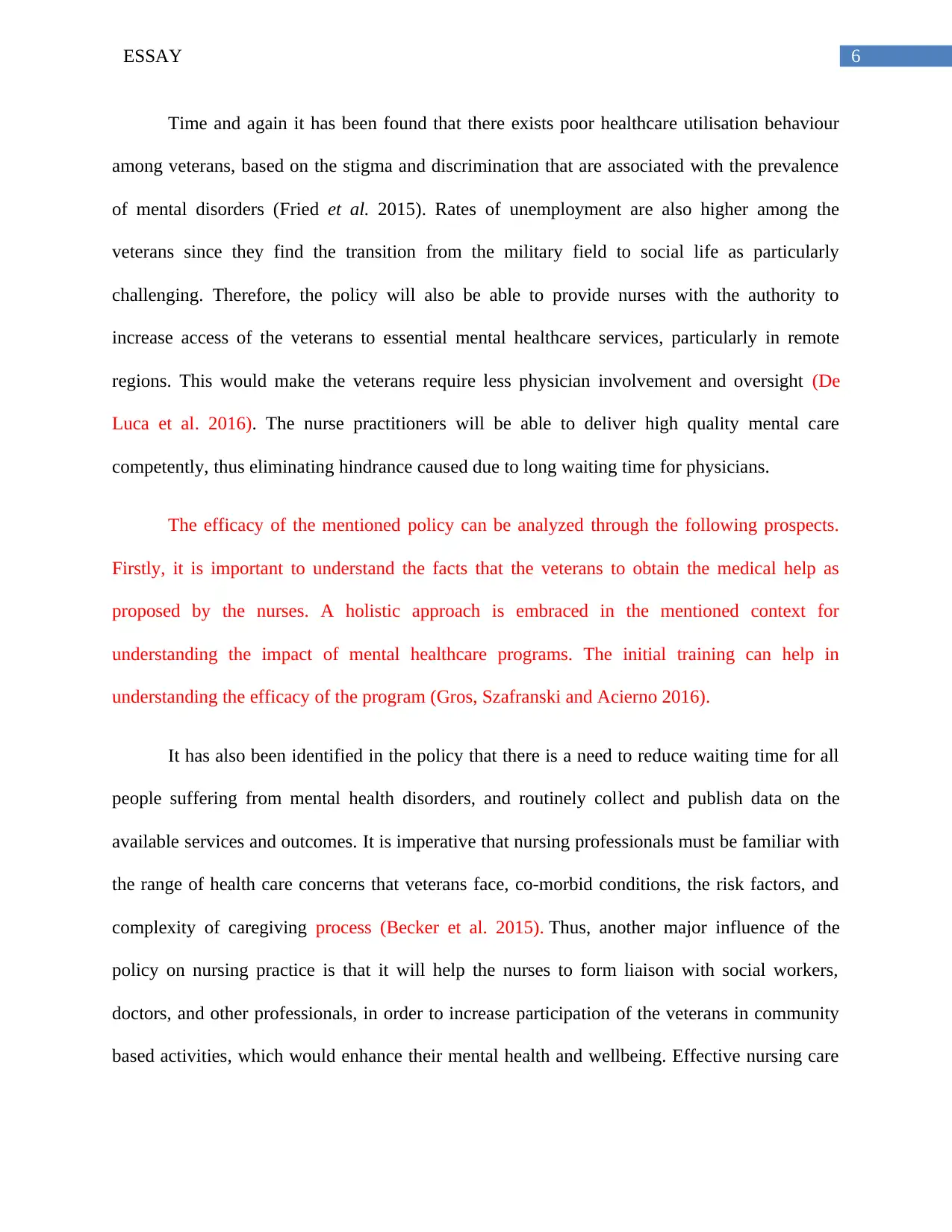
6ESSAY
Time and again it has been found that there exists poor healthcare utilisation behaviour
among veterans, based on the stigma and discrimination that are associated with the prevalence
of mental disorders (Fried et al. 2015). Rates of unemployment are also higher among the
veterans since they find the transition from the military field to social life as particularly
challenging. Therefore, the policy will also be able to provide nurses with the authority to
increase access of the veterans to essential mental healthcare services, particularly in remote
regions. This would make the veterans require less physician involvement and oversight (De
Luca et al. 2016). The nurse practitioners will be able to deliver high quality mental care
competently, thus eliminating hindrance caused due to long waiting time for physicians.
The efficacy of the mentioned policy can be analyzed through the following prospects.
Firstly, it is important to understand the facts that the veterans to obtain the medical help as
proposed by the nurses. A holistic approach is embraced in the mentioned context for
understanding the impact of mental healthcare programs. The initial training can help in
understanding the efficacy of the program (Gros, Szafranski and Acierno 2016).
It has also been identified in the policy that there is a need to reduce waiting time for all
people suffering from mental health disorders, and routinely collect and publish data on the
available services and outcomes. It is imperative that nursing professionals must be familiar with
the range of health care concerns that veterans face, co-morbid conditions, the risk factors, and
complexity of caregiving process (Becker et al. 2015). Thus, another major influence of the
policy on nursing practice is that it will help the nurses to form liaison with social workers,
doctors, and other professionals, in order to increase participation of the veterans in community
based activities, which would enhance their mental health and wellbeing. Effective nursing care
Time and again it has been found that there exists poor healthcare utilisation behaviour
among veterans, based on the stigma and discrimination that are associated with the prevalence
of mental disorders (Fried et al. 2015). Rates of unemployment are also higher among the
veterans since they find the transition from the military field to social life as particularly
challenging. Therefore, the policy will also be able to provide nurses with the authority to
increase access of the veterans to essential mental healthcare services, particularly in remote
regions. This would make the veterans require less physician involvement and oversight (De
Luca et al. 2016). The nurse practitioners will be able to deliver high quality mental care
competently, thus eliminating hindrance caused due to long waiting time for physicians.
The efficacy of the mentioned policy can be analyzed through the following prospects.
Firstly, it is important to understand the facts that the veterans to obtain the medical help as
proposed by the nurses. A holistic approach is embraced in the mentioned context for
understanding the impact of mental healthcare programs. The initial training can help in
understanding the efficacy of the program (Gros, Szafranski and Acierno 2016).
It has also been identified in the policy that there is a need to reduce waiting time for all
people suffering from mental health disorders, and routinely collect and publish data on the
available services and outcomes. It is imperative that nursing professionals must be familiar with
the range of health care concerns that veterans face, co-morbid conditions, the risk factors, and
complexity of caregiving process (Becker et al. 2015). Thus, another major influence of the
policy on nursing practice is that it will help the nurses to form liaison with social workers,
doctors, and other professionals, in order to increase participation of the veterans in community
based activities, which would enhance their mental health and wellbeing. Effective nursing care
Paraphrase This Document
Need a fresh take? Get an instant paraphrase of this document with our AI Paraphraser
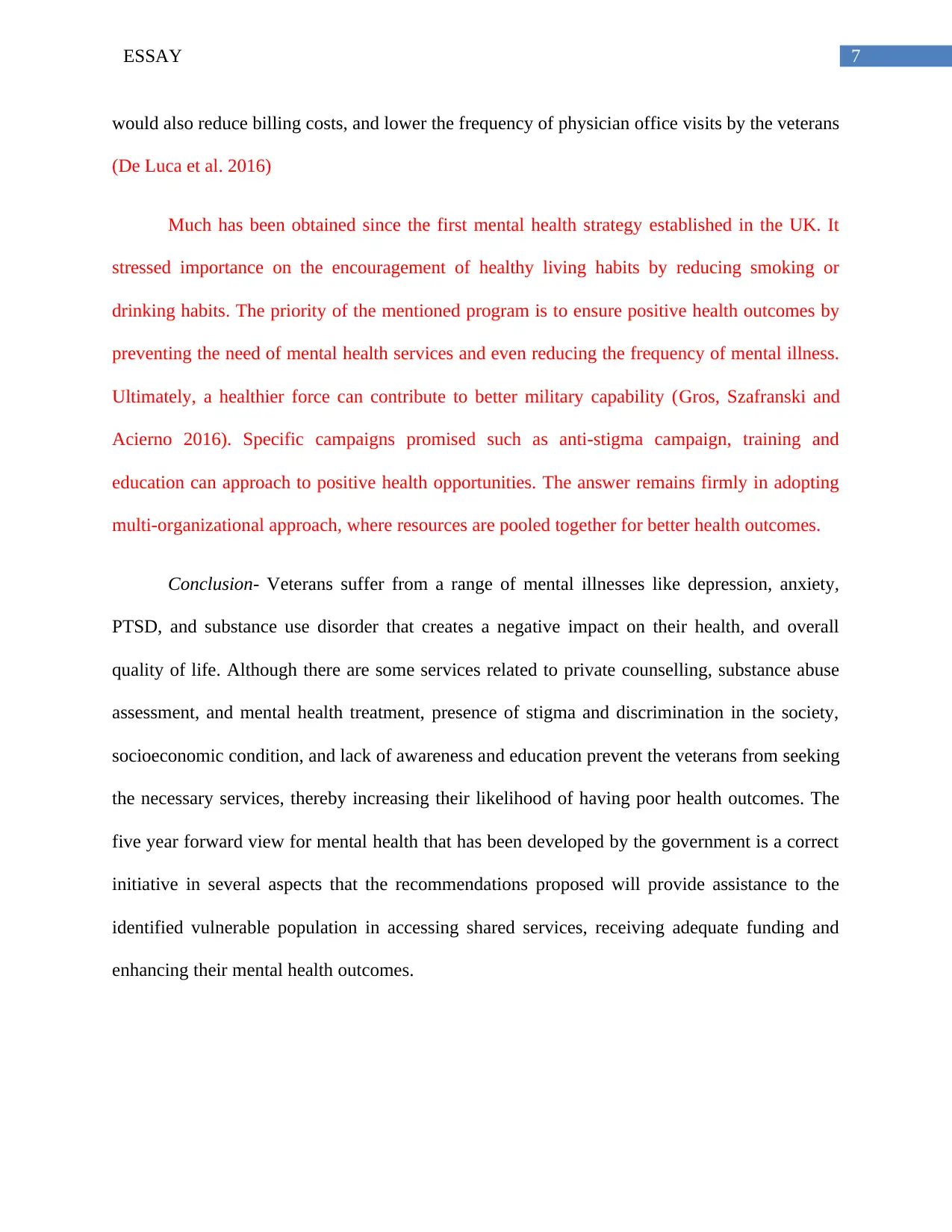
7ESSAY
would also reduce billing costs, and lower the frequency of physician office visits by the veterans
(De Luca et al. 2016)
Much has been obtained since the first mental health strategy established in the UK. It
stressed importance on the encouragement of healthy living habits by reducing smoking or
drinking habits. The priority of the mentioned program is to ensure positive health outcomes by
preventing the need of mental health services and even reducing the frequency of mental illness.
Ultimately, a healthier force can contribute to better military capability (Gros, Szafranski and
Acierno 2016). Specific campaigns promised such as anti-stigma campaign, training and
education can approach to positive health opportunities. The answer remains firmly in adopting
multi-organizational approach, where resources are pooled together for better health outcomes.
Conclusion- Veterans suffer from a range of mental illnesses like depression, anxiety,
PTSD, and substance use disorder that creates a negative impact on their health, and overall
quality of life. Although there are some services related to private counselling, substance abuse
assessment, and mental health treatment, presence of stigma and discrimination in the society,
socioeconomic condition, and lack of awareness and education prevent the veterans from seeking
the necessary services, thereby increasing their likelihood of having poor health outcomes. The
five year forward view for mental health that has been developed by the government is a correct
initiative in several aspects that the recommendations proposed will provide assistance to the
identified vulnerable population in accessing shared services, receiving adequate funding and
enhancing their mental health outcomes.
would also reduce billing costs, and lower the frequency of physician office visits by the veterans
(De Luca et al. 2016)
Much has been obtained since the first mental health strategy established in the UK. It
stressed importance on the encouragement of healthy living habits by reducing smoking or
drinking habits. The priority of the mentioned program is to ensure positive health outcomes by
preventing the need of mental health services and even reducing the frequency of mental illness.
Ultimately, a healthier force can contribute to better military capability (Gros, Szafranski and
Acierno 2016). Specific campaigns promised such as anti-stigma campaign, training and
education can approach to positive health opportunities. The answer remains firmly in adopting
multi-organizational approach, where resources are pooled together for better health outcomes.
Conclusion- Veterans suffer from a range of mental illnesses like depression, anxiety,
PTSD, and substance use disorder that creates a negative impact on their health, and overall
quality of life. Although there are some services related to private counselling, substance abuse
assessment, and mental health treatment, presence of stigma and discrimination in the society,
socioeconomic condition, and lack of awareness and education prevent the veterans from seeking
the necessary services, thereby increasing their likelihood of having poor health outcomes. The
five year forward view for mental health that has been developed by the government is a correct
initiative in several aspects that the recommendations proposed will provide assistance to the
identified vulnerable population in accessing shared services, receiving adequate funding and
enhancing their mental health outcomes.
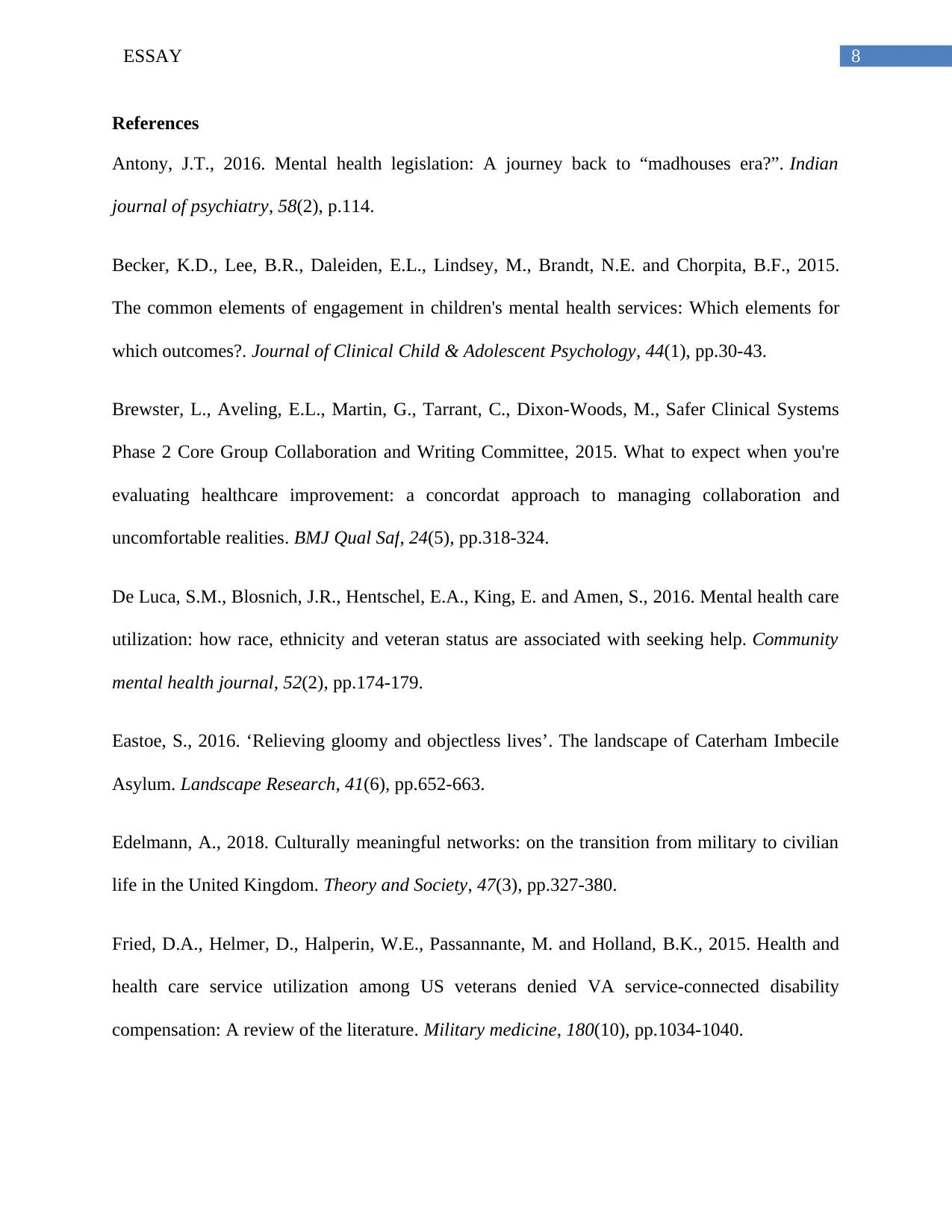
8ESSAY
References
Antony, J.T., 2016. Mental health legislation: A journey back to “madhouses era?”. Indian
journal of psychiatry, 58(2), p.114.
Becker, K.D., Lee, B.R., Daleiden, E.L., Lindsey, M., Brandt, N.E. and Chorpita, B.F., 2015.
The common elements of engagement in children's mental health services: Which elements for
which outcomes?. Journal of Clinical Child & Adolescent Psychology, 44(1), pp.30-43.
Brewster, L., Aveling, E.L., Martin, G., Tarrant, C., Dixon-Woods, M., Safer Clinical Systems
Phase 2 Core Group Collaboration and Writing Committee, 2015. What to expect when you're
evaluating healthcare improvement: a concordat approach to managing collaboration and
uncomfortable realities. BMJ Qual Saf, 24(5), pp.318-324.
De Luca, S.M., Blosnich, J.R., Hentschel, E.A., King, E. and Amen, S., 2016. Mental health care
utilization: how race, ethnicity and veteran status are associated with seeking help. Community
mental health journal, 52(2), pp.174-179.
Eastoe, S., 2016. ‘Relieving gloomy and objectless lives’. The landscape of Caterham Imbecile
Asylum. Landscape Research, 41(6), pp.652-663.
Edelmann, A., 2018. Culturally meaningful networks: on the transition from military to civilian
life in the United Kingdom. Theory and Society, 47(3), pp.327-380.
Fried, D.A., Helmer, D., Halperin, W.E., Passannante, M. and Holland, B.K., 2015. Health and
health care service utilization among US veterans denied VA service-connected disability
compensation: A review of the literature. Military medicine, 180(10), pp.1034-1040.
References
Antony, J.T., 2016. Mental health legislation: A journey back to “madhouses era?”. Indian
journal of psychiatry, 58(2), p.114.
Becker, K.D., Lee, B.R., Daleiden, E.L., Lindsey, M., Brandt, N.E. and Chorpita, B.F., 2015.
The common elements of engagement in children's mental health services: Which elements for
which outcomes?. Journal of Clinical Child & Adolescent Psychology, 44(1), pp.30-43.
Brewster, L., Aveling, E.L., Martin, G., Tarrant, C., Dixon-Woods, M., Safer Clinical Systems
Phase 2 Core Group Collaboration and Writing Committee, 2015. What to expect when you're
evaluating healthcare improvement: a concordat approach to managing collaboration and
uncomfortable realities. BMJ Qual Saf, 24(5), pp.318-324.
De Luca, S.M., Blosnich, J.R., Hentschel, E.A., King, E. and Amen, S., 2016. Mental health care
utilization: how race, ethnicity and veteran status are associated with seeking help. Community
mental health journal, 52(2), pp.174-179.
Eastoe, S., 2016. ‘Relieving gloomy and objectless lives’. The landscape of Caterham Imbecile
Asylum. Landscape Research, 41(6), pp.652-663.
Edelmann, A., 2018. Culturally meaningful networks: on the transition from military to civilian
life in the United Kingdom. Theory and Society, 47(3), pp.327-380.
Fried, D.A., Helmer, D., Halperin, W.E., Passannante, M. and Holland, B.K., 2015. Health and
health care service utilization among US veterans denied VA service-connected disability
compensation: A review of the literature. Military medicine, 180(10), pp.1034-1040.
⊘ This is a preview!⊘
Do you want full access?
Subscribe today to unlock all pages.

Trusted by 1+ million students worldwide
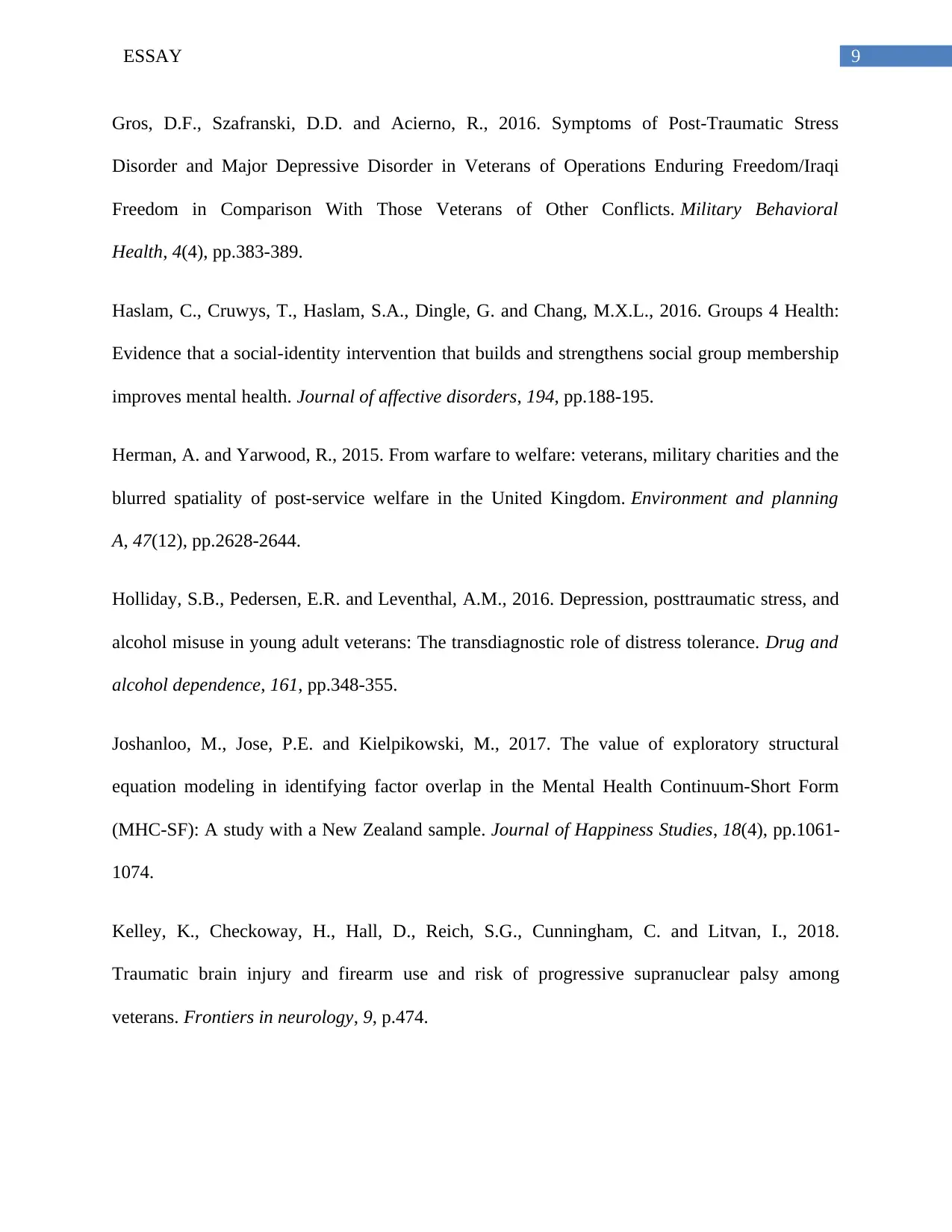
9ESSAY
Gros, D.F., Szafranski, D.D. and Acierno, R., 2016. Symptoms of Post-Traumatic Stress
Disorder and Major Depressive Disorder in Veterans of Operations Enduring Freedom/Iraqi
Freedom in Comparison With Those Veterans of Other Conflicts. Military Behavioral
Health, 4(4), pp.383-389.
Haslam, C., Cruwys, T., Haslam, S.A., Dingle, G. and Chang, M.X.L., 2016. Groups 4 Health:
Evidence that a social-identity intervention that builds and strengthens social group membership
improves mental health. Journal of affective disorders, 194, pp.188-195.
Herman, A. and Yarwood, R., 2015. From warfare to welfare: veterans, military charities and the
blurred spatiality of post-service welfare in the United Kingdom. Environment and planning
A, 47(12), pp.2628-2644.
Holliday, S.B., Pedersen, E.R. and Leventhal, A.M., 2016. Depression, posttraumatic stress, and
alcohol misuse in young adult veterans: The transdiagnostic role of distress tolerance. Drug and
alcohol dependence, 161, pp.348-355.
Joshanloo, M., Jose, P.E. and Kielpikowski, M., 2017. The value of exploratory structural
equation modeling in identifying factor overlap in the Mental Health Continuum-Short Form
(MHC-SF): A study with a New Zealand sample. Journal of Happiness Studies, 18(4), pp.1061-
1074.
Kelley, K., Checkoway, H., Hall, D., Reich, S.G., Cunningham, C. and Litvan, I., 2018.
Traumatic brain injury and firearm use and risk of progressive supranuclear palsy among
veterans. Frontiers in neurology, 9, p.474.
Gros, D.F., Szafranski, D.D. and Acierno, R., 2016. Symptoms of Post-Traumatic Stress
Disorder and Major Depressive Disorder in Veterans of Operations Enduring Freedom/Iraqi
Freedom in Comparison With Those Veterans of Other Conflicts. Military Behavioral
Health, 4(4), pp.383-389.
Haslam, C., Cruwys, T., Haslam, S.A., Dingle, G. and Chang, M.X.L., 2016. Groups 4 Health:
Evidence that a social-identity intervention that builds and strengthens social group membership
improves mental health. Journal of affective disorders, 194, pp.188-195.
Herman, A. and Yarwood, R., 2015. From warfare to welfare: veterans, military charities and the
blurred spatiality of post-service welfare in the United Kingdom. Environment and planning
A, 47(12), pp.2628-2644.
Holliday, S.B., Pedersen, E.R. and Leventhal, A.M., 2016. Depression, posttraumatic stress, and
alcohol misuse in young adult veterans: The transdiagnostic role of distress tolerance. Drug and
alcohol dependence, 161, pp.348-355.
Joshanloo, M., Jose, P.E. and Kielpikowski, M., 2017. The value of exploratory structural
equation modeling in identifying factor overlap in the Mental Health Continuum-Short Form
(MHC-SF): A study with a New Zealand sample. Journal of Happiness Studies, 18(4), pp.1061-
1074.
Kelley, K., Checkoway, H., Hall, D., Reich, S.G., Cunningham, C. and Litvan, I., 2018.
Traumatic brain injury and firearm use and risk of progressive supranuclear palsy among
veterans. Frontiers in neurology, 9, p.474.
Paraphrase This Document
Need a fresh take? Get an instant paraphrase of this document with our AI Paraphraser
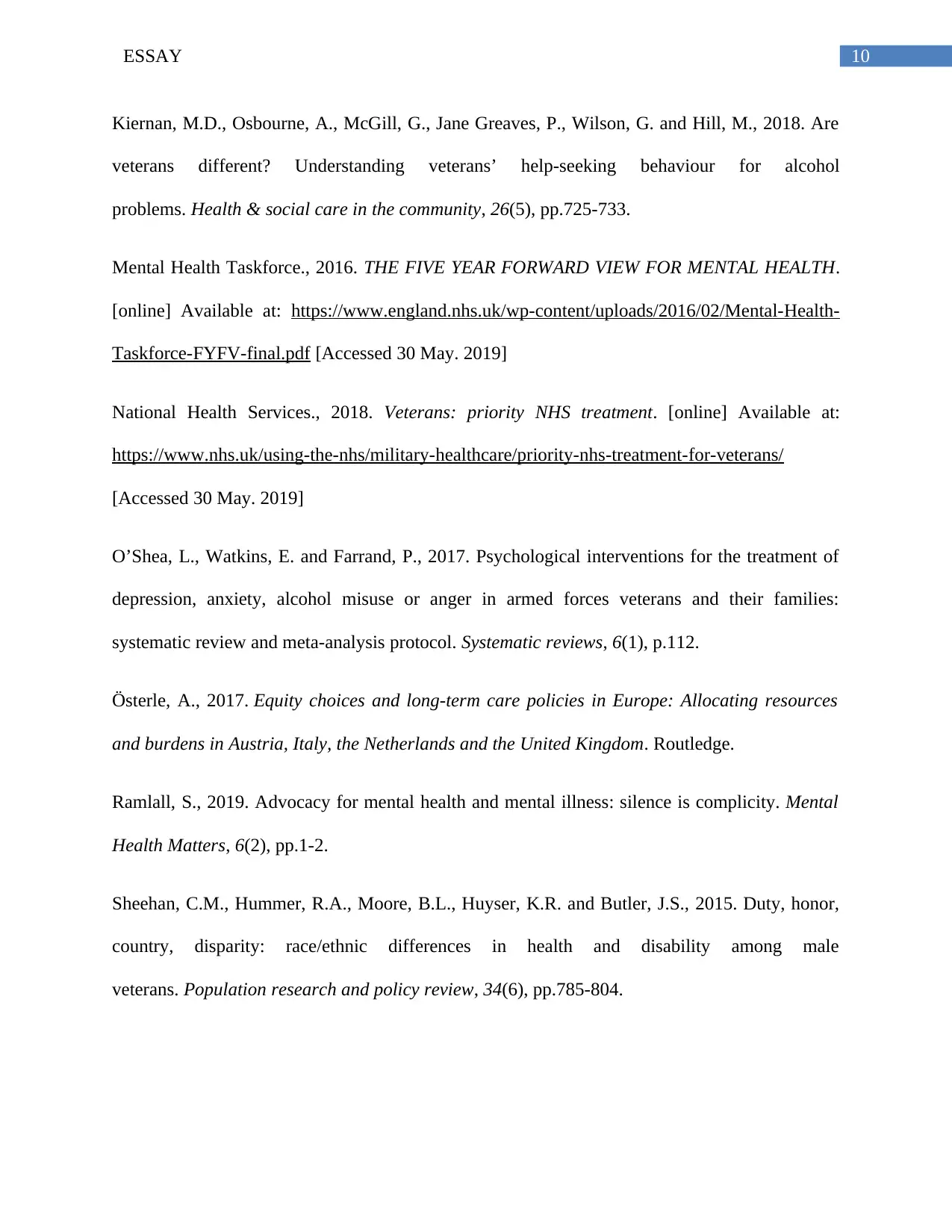
10ESSAY
Kiernan, M.D., Osbourne, A., McGill, G., Jane Greaves, P., Wilson, G. and Hill, M., 2018. Are
veterans different? Understanding veterans’ help‐seeking behaviour for alcohol
problems. Health & social care in the community, 26(5), pp.725-733.
Mental Health Taskforce., 2016. THE FIVE YEAR FORWARD VIEW FOR MENTAL HEALTH.
[online] Available at: https://www.england.nhs.uk/wp-content/uploads/2016/02/Mental-Health-
Taskforce-FYFV-final.pdf [Accessed 30 May. 2019]
National Health Services., 2018. Veterans: priority NHS treatment. [online] Available at:
https://www.nhs.uk/using-the-nhs/military-healthcare/priority-nhs-treatment-for-veterans/
[Accessed 30 May. 2019]
O’Shea, L., Watkins, E. and Farrand, P., 2017. Psychological interventions for the treatment of
depression, anxiety, alcohol misuse or anger in armed forces veterans and their families:
systematic review and meta-analysis protocol. Systematic reviews, 6(1), p.112.
Österle, A., 2017. Equity choices and long-term care policies in Europe: Allocating resources
and burdens in Austria, Italy, the Netherlands and the United Kingdom. Routledge.
Ramlall, S., 2019. Advocacy for mental health and mental illness: silence is complicity. Mental
Health Matters, 6(2), pp.1-2.
Sheehan, C.M., Hummer, R.A., Moore, B.L., Huyser, K.R. and Butler, J.S., 2015. Duty, honor,
country, disparity: race/ethnic differences in health and disability among male
veterans. Population research and policy review, 34(6), pp.785-804.
Kiernan, M.D., Osbourne, A., McGill, G., Jane Greaves, P., Wilson, G. and Hill, M., 2018. Are
veterans different? Understanding veterans’ help‐seeking behaviour for alcohol
problems. Health & social care in the community, 26(5), pp.725-733.
Mental Health Taskforce., 2016. THE FIVE YEAR FORWARD VIEW FOR MENTAL HEALTH.
[online] Available at: https://www.england.nhs.uk/wp-content/uploads/2016/02/Mental-Health-
Taskforce-FYFV-final.pdf [Accessed 30 May. 2019]
National Health Services., 2018. Veterans: priority NHS treatment. [online] Available at:
https://www.nhs.uk/using-the-nhs/military-healthcare/priority-nhs-treatment-for-veterans/
[Accessed 30 May. 2019]
O’Shea, L., Watkins, E. and Farrand, P., 2017. Psychological interventions for the treatment of
depression, anxiety, alcohol misuse or anger in armed forces veterans and their families:
systematic review and meta-analysis protocol. Systematic reviews, 6(1), p.112.
Österle, A., 2017. Equity choices and long-term care policies in Europe: Allocating resources
and burdens in Austria, Italy, the Netherlands and the United Kingdom. Routledge.
Ramlall, S., 2019. Advocacy for mental health and mental illness: silence is complicity. Mental
Health Matters, 6(2), pp.1-2.
Sheehan, C.M., Hummer, R.A., Moore, B.L., Huyser, K.R. and Butler, J.S., 2015. Duty, honor,
country, disparity: race/ethnic differences in health and disability among male
veterans. Population research and policy review, 34(6), pp.785-804.
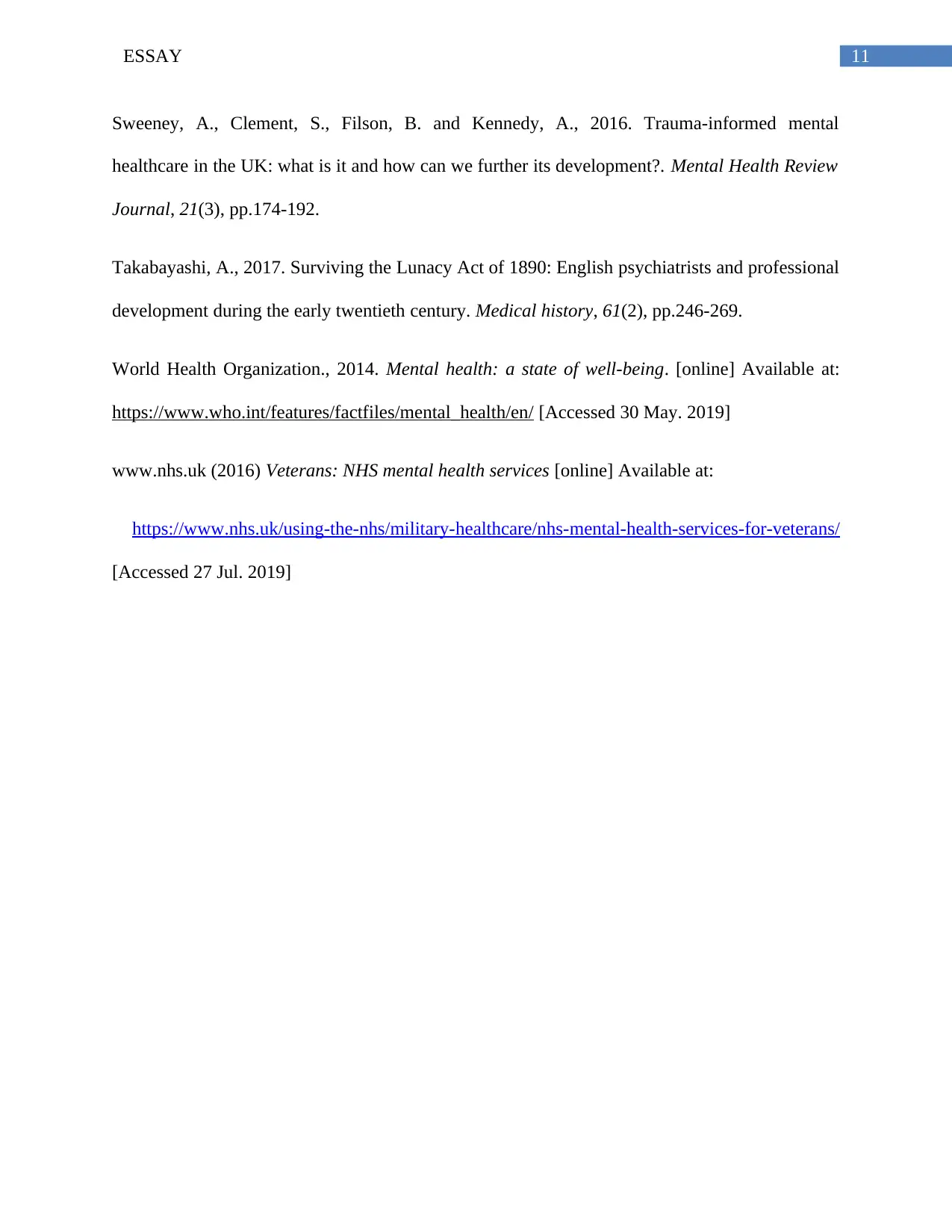
11ESSAY
Sweeney, A., Clement, S., Filson, B. and Kennedy, A., 2016. Trauma-informed mental
healthcare in the UK: what is it and how can we further its development?. Mental Health Review
Journal, 21(3), pp.174-192.
Takabayashi, A., 2017. Surviving the Lunacy Act of 1890: English psychiatrists and professional
development during the early twentieth century. Medical history, 61(2), pp.246-269.
World Health Organization., 2014. Mental health: a state of well-being. [online] Available at:
https://www.who.int/features/factfiles/mental_health/en/ [Accessed 30 May. 2019]
www.nhs.uk (2016) Veterans: NHS mental health services [online] Available at:
https://www.nhs.uk/using-the-nhs/military-healthcare/nhs-mental-health-services-for-veterans/
[Accessed 27 Jul. 2019]
Sweeney, A., Clement, S., Filson, B. and Kennedy, A., 2016. Trauma-informed mental
healthcare in the UK: what is it and how can we further its development?. Mental Health Review
Journal, 21(3), pp.174-192.
Takabayashi, A., 2017. Surviving the Lunacy Act of 1890: English psychiatrists and professional
development during the early twentieth century. Medical history, 61(2), pp.246-269.
World Health Organization., 2014. Mental health: a state of well-being. [online] Available at:
https://www.who.int/features/factfiles/mental_health/en/ [Accessed 30 May. 2019]
www.nhs.uk (2016) Veterans: NHS mental health services [online] Available at:
https://www.nhs.uk/using-the-nhs/military-healthcare/nhs-mental-health-services-for-veterans/
[Accessed 27 Jul. 2019]
⊘ This is a preview!⊘
Do you want full access?
Subscribe today to unlock all pages.

Trusted by 1+ million students worldwide
1 out of 12
Related Documents
Your All-in-One AI-Powered Toolkit for Academic Success.
+13062052269
info@desklib.com
Available 24*7 on WhatsApp / Email
![[object Object]](/_next/static/media/star-bottom.7253800d.svg)
Unlock your academic potential
Copyright © 2020–2025 A2Z Services. All Rights Reserved. Developed and managed by ZUCOL.





